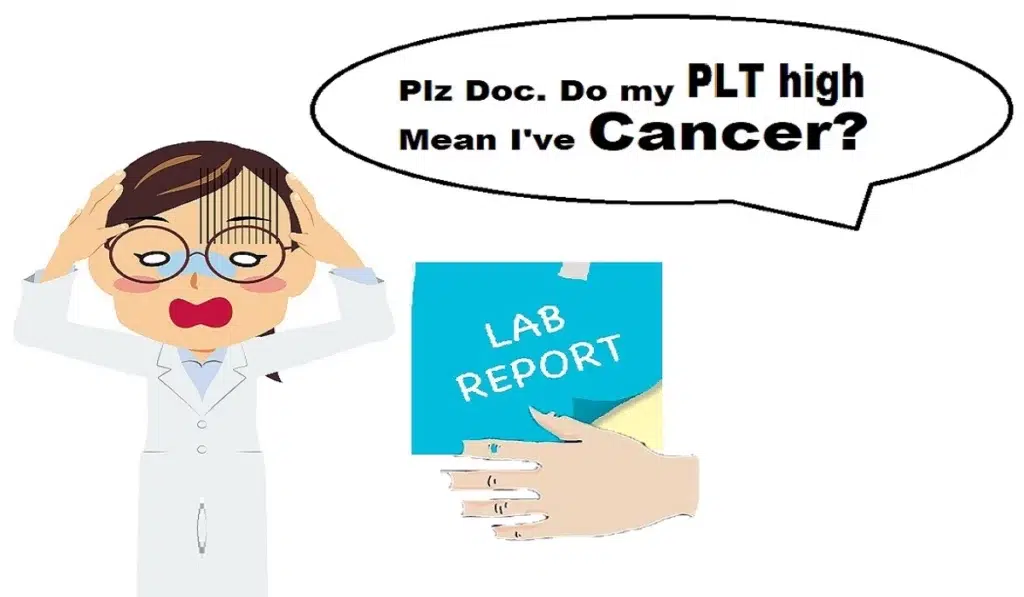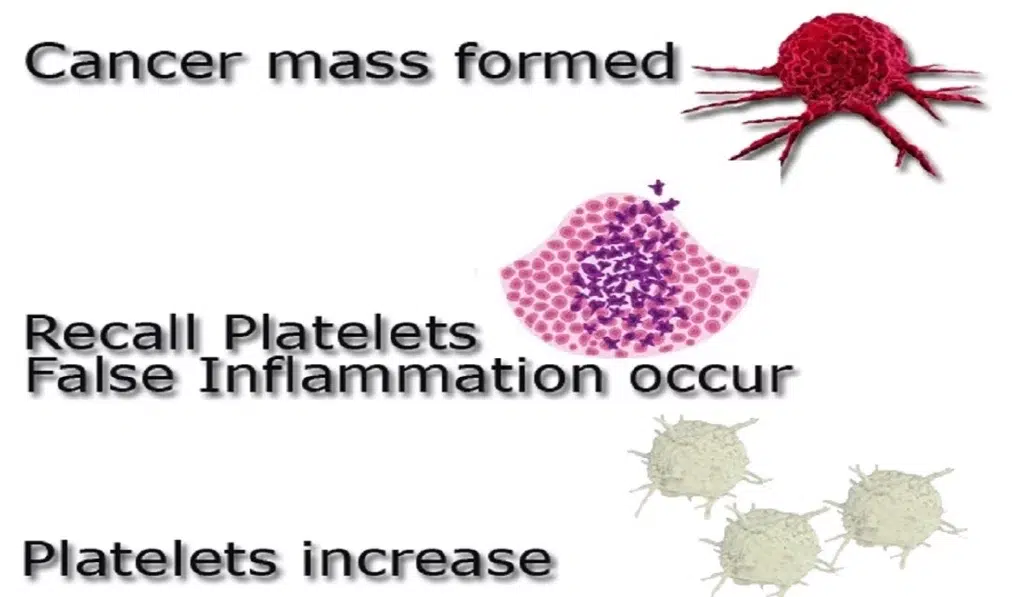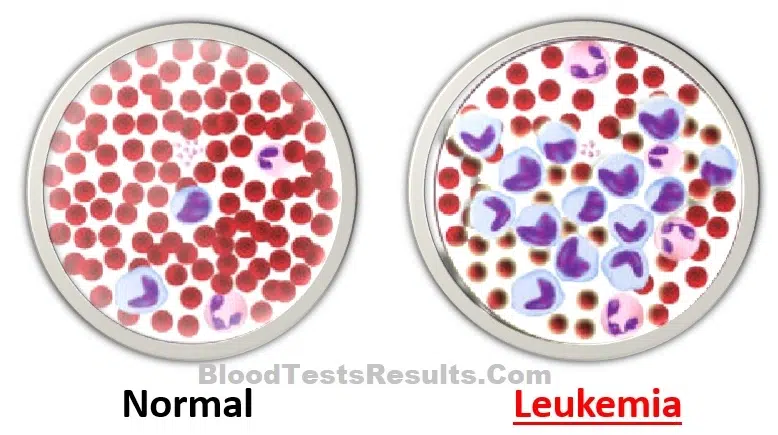Elevated platelets count is common in lab results of patients with advanced stage cancers and if their lab results show the flag "platelets high", it's probably a marker of progression of the cancer especially if the platelets level increasing too much with the time, but take care, some cancers suppress platelets and some other cancers increase them, also, some diseases elevate platelets count without cancer, please read carefully to understand which cancer can affect platelets count and which cancers can't affect platelets?
What we are explaining here?
What Cancers can increase platelets count?
Causes with real case studies
Example 1: Chronic lymphocytic leukemia
Example 2: Essential Thrombocytosis
Example 3: Polycythemia Vera (PV)
Example 4: Lung cancers
Example 5: Colon cancer and rectum cancer
Does Platelets count increase or decrease during cancers?
Signs and Symptoms
What's the level of platelets in CBC test of a patient with cancer?
Definitions of cancer
Please note that there're two main categories of thrombocytosis (elevated blood platelets): reactive thrombocytosis, which occurs as a side effect of reactive disease such as infections, anemia, and some cancers), and essential thrombocytosis or thrombocythemia (ET) which is a rare blood platelets cancer, the common reason is genetic mutations (belongs to a disease category called myeloproliferative neoplasms or myeloproliferative disorders), if ET prolonged, it can develop a cancer called acute myeloid leukemia (AML).

Additional Resources:
How Can Bacterial Infections Cause Elevated Platelets Count?
Can Viral Infections Cause Platelets High Count?
What type of cancer causes high platelet count?
If you were asking which cancers cause raised platelets?
The typical answer is that a cancer developed in the organ's tissues can raise the count of blood platelets (thrombocytosis), e.g. lung, endometrial, gastric, esophageal, or colorectal cancers in which the platelets blood test shows elevated level of platelets or the result is just near the upper normal limit, i.e. the platelet count may appear just above the normal limit while the body contain a type of tissue cancers.
On the other hand, the blood cancers, e.g. the leukemia that doesn't cause elevation in blood platelets but they cause a decline in the platelets count (Thrombocytopenia) in the blood test, that's because these types of cancers exaggerate the production of white blood cells at the expense of other types of blood cells.
You should know that: Even cancer that occurs in organ's mass may cause a slight increase in the number of platelets, but with the increased demand for platelet production as cancer progresses in the stages of development, the bone marrow may have any disruption or depletion of resources, which ultimately leads to a severe decrease in the number of Platelets, Red blood cells, and white blood cells as well.
How do cancers cause high platelets count?
There are two major paths of cancers in men and women, one is the cancer in the blood-cell-forming-tissue inside the bones marrow (e.g. spongy tissue), the second occur in the other tissues (e.g. connective tissue, epithelial tissue, and muscle tissue), each type has its own effect on other blood components, examples of tissue cancers are the womb, ovarian, breast, testis, and lung cancers; examples of blood cell cancers are leukemias and lymphoma.
The way that cancers of tissues affect blood platelets begins after the cancer's first stages when trying to activate the near platelets to make shield around the cancerous area, the suggested reason is to isolate cancerous mass from body defense mechanisms, consequently, the activated platelets recall other blood cells which results in in unwanted inflammation (the cancer-associated inflammation) around the tumor site which has two main functions: firstly act as camouflage, disguise, or shield to protect tumor cells, accordingly the bone marrow become busy to make unneeded platelets and white cells because the cancer cells cheating or manipulating the biological systems of human body, secondly: the platelets release some biological molecules upon their activation which falsely benefit the tumor cells in their metastasis (distribution), accordingly the platelets falsely promote carcinogenesis (processes of copying more cancer cells).
That's why the full blood count during some cancers shows elevated white blood cells (leukocytosis), elevated platelets (thrombocytosis), Low red blood cells and low hemoglobin (Anemia).
PCT and PDW represent the estimation of platelets volume and variation in size respectively, in cancers of specific tissues (e.g. lung, rectal, breast) the platelets produced in a hurry which means their sizes will be bigger with the time of cancer progression which impacts on PCT, PCV, and PDW% indices and lead to elevation of their values in CBC test result.

In case of blood tumors "e.g. leukemia, lymphoma", the spongy tissue inside marrow of bones produces and releases large numbers of abnormal cells or proliferate the normal cells in huge quantities, thus the bone marrow be unable to create other healthy cells, consequently, platelets and red cells decrease as a result of crowding the bone marrow with the production of carcinogenic white blood cells. Thus the full blood count shows low platelets (Thrombocytopenia) instead of (elevation of platelets) that shown in other tissue tumors.
For example: blood cancer of the type "Chronic lymphocytic leukemia" result by copying too much "normal lymphocytes", one type of white blood cells, therefore the production of other cells "e.g. platelets and red cells" is blocked, thus the CBC test results show:
- Elevated white blood cells to greater than 50.000 which indicate leukocytosis leukemia
- Elevated lymphocyte count over 40.000, almost all of them are of the normal type not the carcinogenic.
- Low Platelets count to 10,000 in some patients which indicate severe thrombocytopenia.
- The High PCV, elevated PDW, the blood smear examination may reveal blast cells which is elder cells that made (and must stay) inside the bone marrow, which all of that indicate malignancy advancement.
- RBCs count less than 2,000,000 and hemoglobin less than 6.0 which indicate severe anemia.
Therefore, in CLL leukemia, a type of blood cancers, the platelets blocked from being produced due to crowd of massive production of huge amount of lymphocytes, therefore the platelets count in leukemia blood cancers decrease not increase.

For example 2: Essential Thrombocytosis is considered a platelets cancer of the type myeloproliferative neoplasms, other hematology books consider ET as relative benign blood tumor, in essential Thrombocytosis the platelets level exceeds 1,000,000 without reactive disease, thus why it's called essential or primary thrombocytosis.
Example 3: Polycythemia Vera (PV) is considered a rare Red Blood Cells cancer because it causes the bone marrow to produce too many RBCs and affect platelets as a side effect, therefore, in PV the platelets count is elevated to 600,000 or even to 999,000 in some cases.
For example 3: lung cancer, starts when invades the lung cells then spreads (metastasis) to the whole respiratory system and nearby lymph nodes and even to the other parts of the body. But in lung cancer, are the blood test results show high or low platelets? initially, the lung cancer recalls too many platelets to make shield to the tumor cells which will increase platelets count (Secondary Thrombocytosis) to 450,000 or may slightly higher, but if the the cancer metastasizes (spreads) to the bone marrow, the platelets production will be negatively affected and therefore, the CBC test results show low platelets count (Thrombocytopenia).
For example 4: colorectal cancer that starts in the colon or in the rectum also leads to false inflammation effect which causes outside the range platelets count but within a limited level because another event may happen, the bleeding or hemorrhage usually occur during colorectal cancers and lead to blood loss including platelets loss which results in decrease in the platelets as well, therefore, the platelets count in the colorectal cancer may ranges from high-normal (400,000-450,000) up to slightly high level (500,000-550,000) for adult patients. Also MPV during colon and rectal cancer can be normal, and PDW% may be slightly elevated.
For example 5: Uterine cancer and fibroids can affect platelets as well, but this is upcoming post, please follow...
Do platelets count go up or down with cancer?
It does mean that not all types of cancers can elevate platelets count in the blood, if the tumor is in a specific organ's tissue then it abuses platelets and other cells to serve it which elevate white blood cell count and platelets as well and show high platelets count in the CBC test results, but if the white blood cells is cancerous, the resultant cancer (leukemia) will lower the blood platelets count in the blood counting test. Red blood cells and Hemoglobin usually decreased in all cancers (indicate severe anemia).
What happens if platelets are high in cancer patients?
Cancers that occur in the tissues of organs usually cause elevated blood platelets count because the tumor tissue draw the platelet particles and blood cells into the formed cancerous mass which lead to producing too much platelets and other cells, thus WBC and PLTs are elevated while the RBCs is reduced.
If you were asking about what are the signs of high platelets during cancer?
This is when to tell if the platelets high count is due to cancer; Elevated platelets level (Thrombocytosis) during cancer is not the primary event but the cancer itself is, thus the body may or may not show symptoms of thrombocytosis which may include:
Skin signs: Superficial Thrombophlebitis, an inflammation of the skin along a vein including apparent redness, darkening, hardening, warmth, tenderness and worsen pain when added pressure. Skin bruising which can be seen by naked eyes.
The signs and symptoms of an elevated platelet count that are linked to blood clots and bleeding may include:
- Weakness and Dizziness
- Bleeding, Melena: Bleeding in the stomach or intestinal tract that appear on the fecal occult blood test. Bleeding from nose, mouth or gums which can be indicated in CBC test and PT test.
- Headache
- Chest Pain
- Tingling in the hands and feet.
How do platelets increase in cancer patients?
Early stages of tumors in organs can followed by mild elevated platelets count, but as the cancer progress it may additionally elevate platelets count, therefore the very high platelets count is indicator of metastasis (spreading the tumor cells to the other parts), but at the end stages it may cause platelets test results to drop especially if the patient received chemotherapy, the treatment of cancer with strong chemicals that kill tumor cells and stop them from producing.
Thus, the chemotherapy kills platelets as well as the cancers cells and lead to low platelets count in the blood test (Thrombocytopenia), therefore, the doctors may stop the treatment doses to let the bone marrow produce enough platelets before they give the patients another dose (letting the PLT be high in CBC test firstly), or may continue the treatment but give them urgent a platelet transfusion to raise the count of platelets.
Based on that, chemotherapy (the cancer treatment) doesn't elevate the platelets count but is commonly cause very low platelets levels in CBC test along with the apparent symptoms of thrombocytopenia.
What is the platelet count of cancer patients?
Usually, Cancers of organs (e.g. colorectal, lung, ovarian, or uterine) in many cases show their platelets count at the borderline or near the highest normal limit (300,000-400,000), but that in the mild to moderate stages, consequently, these cancers can cause mild elevated platelets count (400,000-450,000), or highly elevated count of platelets if the cancer advanced to the metastasis phase.
Blood cancers usually lower the platelets count below (15,000 - 50,000) which is the minimum platelet count for chemotherapy too.
Some information about cancers you may want to know
Doctors classify cancer using the site where the cancer began or the type of tissue in which the cancer arose
The major types of cancer are carcinoma, sarcoma, melanoma, lymphoma, and leukemia.
- Carcinoma, solid tumors that start in the skin or covering tissues of the internal organs, e.g. prostate cancer, breast cancer, lung cancer, and colorectal cancer.
- Sarcoma, a cancer that begins in bones and soft tissues such as muscles and fats, e.g. Osteosarcoma. LDH and ALP blood tests can help rule out such cancers.
- Melanoma, a type of cancers that begins at the areas of the body with pigmented tissues (have the melanocytes that give the skin its brown color) such as Skin and Eyes.
- Lymphoma is a cancer of the lymphatic system (lymph glands, spleen, thymus gland and bone marrow. CBC test can detect abnormally elevated lymphocytes count.
- Leukemia is a medical term for cancers of blood-producing tissues (e.g. bone marrow and lymphatic system)
- Blastoma: caused by malignancies in precursor cells or thought is a tumor may be arising in embryonic tissue.
Worldwide deadly cancers that killed the most people in past years are lung cancer, colorectal cancer, and liver
Thus, we can conclude that not all cancers can cause elevated platelets level, and the increasing level of platelets isn't the only indicator of cancer because their are other non-cancerous reasons that elevate platelets count such as infections and Iron deficiency anemia.
It's possible that your case isn't discussed here, so that we urge you to messaging us for your results interpretation.
